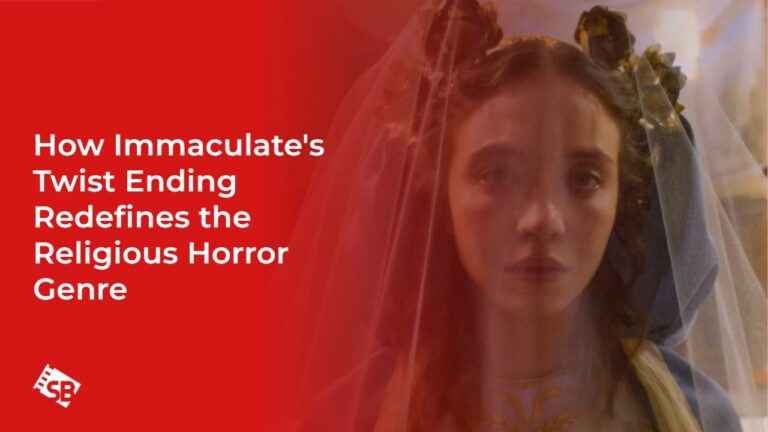Sydney Sweeney is on an outstanding performance streak with another movie, but this time it’s not a light-hearted rom-com but a disturbing religious horror that will have you shocked to your wits.
Immaculate is a psychological plus religious horror starring Sydney Sweeney as Cecilia, an American nun of devout faith, who begins her new journey in a remote convent in the Italian countryside.
Directed by Michael Mohan who also worked with Sweeney on The Voyeurs in 2021, and written by Andrew Lobel. The plot unfolds as Cecilia discovers she’s pregnant, despite her vows of chastity, leading to questions of whether it’s a miracle or something more sinister.
Immaculate isn’t your typical possession flick. While it initially sets the stage for a classic “is it good or evil?” narrative, the film takes a sharp turn in its final act, leaving audiences reeling and redefining the boundaries of religious horror.
The Setup: Faith and Doubt Collide
The film expertly plays with the ambiguity of her situation. As Cecilia grapples with this impossible pregnancy, the film delves into themes of faith, doubt, and the supernatural.

Sweeney auditioned for this role in 2014 when she was 17.
Something Is Not Right…
As the plot thickens, you’ll find clues of the pregnancy being not normal, The rugged breathing of the baby after birth is a sign that it’s not a good omen. Although the movie does not show what the baby looks like, its breathing signifies that it is not human, which raises a lot of questions about the nature of the pregnancy.
Fear and Resentment
You’ll see Cecilia, resenting Father Tedeschi, the main antagonist at the end of the movie, given his decades-old history of genetic experimentation, Cecilia’s miracle pregnancy turns out to be another one of his attempts to resurrect or create a Messiah.
Fearful of the fact that she will die once the baby is born — namely because the convent would probably discard her to focus on the child. Sister Cecilia witnesses the other nuns cutting out Gwen’s tongue after she speaks out against the convent and the secrets they’ve been keeping.
Does the Baby Turn Out to be the Messiah?
This remains a piece of the puzzle that combines the whole story into making a lot of sense. Forced into existence by unnatural ways, brought to fruition by someone else, Sister Cecilia was convinced that she gave birth to the devil.
This was not how the second coming of Jesus was supposed to be, and therefore she ends this evil by crushing the baby with a rock in the most brutal way. (A scene that will be recounted as one of the most iconic endings for a religious horror)
The Twist: A Descent into Madness, Not Demonic Possession

Sydney Sweeney was previously directed by Michael Mohan in the 2021 film “The Voyeurs” and the 2018 TV series “Everything Sucks!”
Immaculate masterfully builds tension, leading us to believe Cecilia is either carrying the child of an angel or a demon. However, the climax reveals a shocking truth: Cecilia’s pregnancy is a delusion, a manifestation of her repressed trauma and mental illness.
The remote convent, the judgmental whispers of the other nuns, and the isolation exacerbate her fragile mental state, leading to a complete break from reality.
Redefining Religious Horror: From External Evil to Internal Demons
This twist ending is where Immaculate truly shines. It subverts the expectations of the religious horror genre, shifting the focus from external evil forces to the internal demons that haunt us. The film becomes a powerful exploration of mental illness, trauma, and the societal pressures placed upon women, particularly within religious contexts.
An Impactful Horror with Depth: A Conversation Starter
Immaculate’s bold narrative choice sparks important conversations. It challenges the stigma surrounding mental health within religious communities and encourages empathy and understanding for those struggling with internal demons.
The film also raises questions about the power structures within religious institutions and the impact they can have on individuals, especially women.
Immaculate is not just a horror film; it’s a commentary on the human condition. It forces us to confront the darkness within ourselves and recognize that sometimes the most terrifying monsters are not supernatural entities, but the ones we create in our minds.
By shifting the focus from external evil to internal struggles, Immaculate redefines the religious horror genre and leaves a lasting impact on its viewers. It’s a film that stays with you long after the credits roll, prompting reflection and discussion on faith, mental health, and the complexities of the human experience.
Following its premiere at the SXSW Film Festival on March 22nd, Immaculate wasted no time reaching a wider audience. The movie is available for streaming on Prime Video and Apple TV. Horror fans eager to experience the film’s unique twist on the genre can now do so from the comfort of their own homes.

